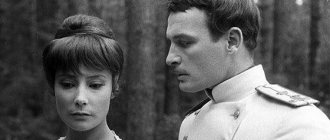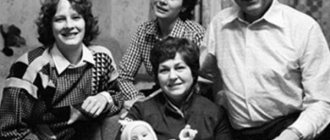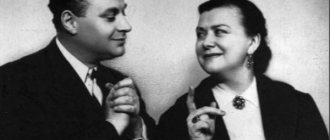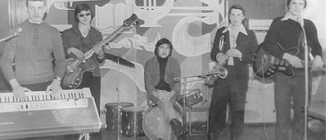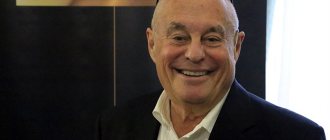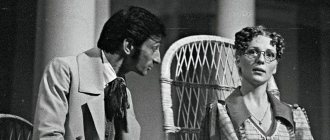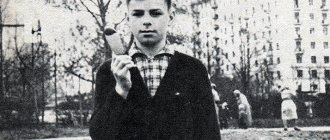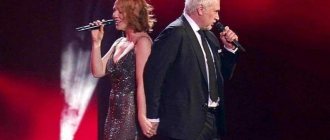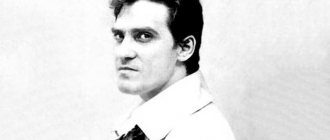Valery Abisalovich Gergiev (born 1953) – Soviet and Russian conductor. Artistic director and general director of the Mariinsky Theater since 1988, chief conductor of the Munich Philharmonic Orchestra, from 2007 to 2020 he headed the London Symphony Orchestra.
Dean of the Faculty of Arts of St. Petersburg State University. Chairman of the All-Russian Choral Society. People's Artist of Russia and Ukraine. Honored Worker of Kazakhstan.
There are many interesting facts in Gergiev’s biography, which we will discuss in this article.
So, here is a short biography of Valery Gergiev.
Biography of Gergiev
Valery Gergiev was born on May 2, 1953 in Moscow. He grew up and was brought up in the Ossetian family of Abisal Zaurbekovich and his wife Tamara Timofeevna.
In addition to him, Valery’s parents had two more daughters – Svetlana and Larisa.
Childhood and youth
Almost all of Gergiev’s childhood was spent in Vladikavkaz. When he was 7 years old, his mother took her son to a music school for piano and conducting, where her eldest daughter Svetlana was already studying.
At school, the teacher played a melody and then asked Valery to repeat the rhythm. The boy successfully completed the task.
Then the teacher asked to play the same melody again. Gergiev decided to resort to improvisation, repeating ri.
As a result, the teacher stated that Valery had no hearing. When the boy becomes a famous conductor, he will say that then he wanted to improve the musical series, but the teacher simply did not understand this.
When the mother heard the teacher’s verdict, she still ensured that Valera was enrolled in school. Soon, he became the best student.
At the age of 13, the first tragedy occurred in Gergiev’s biography - his father died. As a result, the mother had to raise three children herself.
Valery continued to study the art of music, and also did well in secondary school. An interesting fact is that he repeatedly participated in mathematical Olympiads.
Having received a certificate, the young man entered the Leningrad Conservatory, where he continued to demonstrate his talents.
Musician's childhood
Valery Gergiev's birthplace is Moscow, but his childhood was spent in North Ossetia, in Vladikavkaz. The family had three children. Father, Abisal Zaurbekovich, was a battalion commander during the war years. He died when Valery was only thirteen years old. The mother took full responsibility for raising the child, but the future conductor inherited the best personal qualities from his father.
The boy's mother took him to a music teacher when the child was seven years old. At that time, he was no longer interested in music, but in football. After listening to Valery’s attempts to reproduce the melody several times, the teacher came to the conclusion that the student was deprived of musical hearing.
However, according to the later memoirs of Valery Abisalovich, he then simply wanted to improve the musical series. But the teacher did not understand this improvisation and said that it was better for the boy to really play football. This happens quite often that a student who surpasses the teacher in talent does not find understanding with him.
Nevertheless, his caring mother insisted that the boy be accepted into a music school. Valery was able to become the most promising student. He inherited from his father the ability to achieve goals , realize what he promised, and treat his family with love. At the same time, his studies in secondary school did not suffer: Valery took part in mathematics Olympiads. As they say, if a person is talented, then he is talented in everything.
Music
When Valery Gergiev was a fourth-year student, he took part in an international conducting competition that took place in Berlin. As a result, the jury members recognized him as the winner.
A few months later, the student won another victory at the All-Union Conducting Competition in Moscow.
After graduation, Gergiev worked as an assistant conductor at the Kirov Theater, and after 1 year he was already the chief director of the orchestra.
Later, Valery headed the orchestra in Armenia for 4 years, and in 1988 he became the main conductor of the Kirov Theater. During that period of his biography, he began to organize various festivals based on the works of famous composers.
During productions of operatic masterpieces by Pyotr Tchaikovsky, Sergei Prokofiev and Nikolai Rimsky-Korsakov, Gergiev collaborated with world-famous directors and set designers.
After the collapse of the USSR, Valery Georgievich often traveled to perform abroad.
In 1992, the Russian made his debut at the Metropolitan Opera as conductor of the opera Othello. After 3 years, Valery Abisalovich was invited to conduct the Philharmonic Orchestra in Rotterdam, with which he collaborated until 2008.
In 2003, the musician opened the Valery Gergiev Foundation, which organized various creative projects.
Four years later, the maestro was entrusted with leading the London Symphony Orchestra. Music critics praised Gergiev's work. They noted that his work is distinguished by expression and an extraordinary interpretation of the material.
At the closing of the 2010 Winter Olympics, held in Vancouver, Valery Gergiev conducted the orchestra on Red Square via teleconference.
In 2012, a major event was organized with the assistance of Gergiev and James Cameron - a 3D broadcast of Swan Lake, which could be viewed anywhere on the planet.
The following year, the conductor was among the Grammy Award nominees. In 2014, he took part in a concert dedicated to Maya Plisetskaya.
The situation today, the main achievement of Valery Gergiev is his work at the Mariinsky Theater, which he has directed for more than 20 years.
An interesting fact is that the musician spends about 250 days a year with his theater troupes. During this time, he managed to train many famous singers and update their repertoire.
Gergiev works closely with Yuri Bashmet. They take part in joint musical events and also give master classes in different cities of Russia.
Gergiev, Valery Abisalovich
Born on May 2, 1953 in Moscow in the family of Abisal Zaurbekovich Gergiev and Tamara Timofeevna (Tatarkanovna) Lagkueva. His father was a military man, a participant in the Great Patriotic War, his mother worked as an electronic equipment engineer. In 1959, the family moved to Ordzhonikidze (now Vladikavkaz, Republic of North Ossetia-Alania). As a child, Valery Gergiev was interested in drawing, mathematics, and also playing football.
Graduated from city music school number 1 named after. P.I. Tchaikovsky in piano class. In 1968-1972 Studied at the piano department of the Ordzhonikidze School of Arts (now the Vladikavkaz College of Arts named after Valery Gergiev), where he also took an optional course in symphonic conducting. In 1977 he graduated from the Leningrad Conservatory. ON THE. Rimsky-Korsakov (now the St. Petersburg State Conservatory) in the class of opera and symphony conducting.
In 1976 he became a laureate of the IV All-Union Conducting Competition (Moscow), and in 1977 - a laureate of a competition for young conductors organized by the Herbert von Karajan Foundation (West Berlin). In 1977 he was accepted into the Leningrad State Academic Opera and Ballet Theater named after. CM. Kirov (now the State Academic Mariinsky Theater) to the position of assistant to the chief director (from 1976 to 1988 he was Yuri Temirkanov). The following year he became the theater conductor, making his debut in Sergei Prokofiev's opera War and Peace based on the novel of the same name by Leo Tolstoy. In 1981-1985, simultaneously with work at the Leningrad State Academic Opera and Ballet Theater. CM. Kirov, was the director of the State Symphony Orchestra of the Armenian SSR. In 1988, he took the position of chief conductor of the Leningrad State Academic Opera and Ballet Theater. CM. Kirov and the artistic director of his opera troupe. In 1995, he became the chief conductor of the Rotterdam Philharmonic Orchestra (Netherlands; he worked there until 2008, then becoming its honorary conductor). On August 14, 1996, by decree of Russian President Boris Yeltsin, he was appointed artistic director-director of the Mariinsky Theater, heading the orchestra, as well as the opera and ballet troupes. Under Gergiev, the repertoire of the Mariinsky Theater Orchestra, in addition to operas and ballets, included symphonic works and works of other genres of philharmonic music. The orchestra under his leadership performed all the symphonies of Sergei Prokofiev, Pyotr Tchaikovsky, Dmitry Shostakovich, Ludwig van Beethoven and Gustav Mahler, as well as works by Igor Stravinsky, Rodion Shchedrin, Sofia Gubaidulina and others. Along with this, in 2003, for the first time in the history of Russian opera theater, on the initiative and under the leadership of Gergiev, a production in German of Richard Wagner’s tetralogy “The Ring of the Nibelung” was staged on the stage of the Mariinsky Theater. Since 1997, he has been the conductor of the Orchestra of the World, a multinational ensemble that unites the best musicians from 60 leading orchestras from 45 countries. It was first collected by the Hungarian conductor Georg Solti in 1995 in connection with the 50th anniversary of the UN. In 2003, he founded the Valery Gergiev Foundation, which is engaged in charitable activities in the field of art, culture, enlightenment and education. At the end of 2004, after a terrorist attack at school number 1 in the city. Beslan (Republic of North Ossetia - Alania), held a series of charity concerts “Beslan. Music for life." In 2007, he became chief conductor of the London Symphony Orchestra (he served in this position until the fall of 2015). In August 2008, with the Mariinsky Theater Symphony Orchestra, he gave a concert in the central square of Tskhinvali dedicated to the memory of civilian victims in the war in South Ossetia. In 2009, he created the Mariinsky record label, which has released more than 30 music discs, including a recording of all the symphonies of Dmitry Shostakovich. In March 2012, he performed in Tokyo with the local symphony orchestra at a charity concert in memory of the victims of the earthquake and tsunami in Japan that occurred in March 2011. In September 2012, he held a concert with the Mariinsky Theater Symphony Orchestra in Krymsk (Krasnodar Territory), shortly before seriously damaged by flooding. Since 2013, Valery Gergiev has been the conductor of the US National Youth Orchestra (founded in New York on the initiative of Carnegie Hall) during its European performances. On February 15, 2013, he was elected chairman of the All-Russian Choral Society (VCS). In the same year, on the initiative of Gergiev, the Children's Choir of Russia was created on the basis of the WChO, which in February 2014 took part in the closing ceremony of the XXII Winter Olympic Games in Sochi (Krasnodar Territory). In September 2015, he became artistic director and chief conductor of the Munich Philharmonic Orchestra (Germany). On May 5, 2020, the Mariinsky Theater Symphony Orchestra under the direction of Gergiev performed in the ancient amphitheater of Palmyra (Syria) with the concert “With a Prayer for Palmyra.” In March 2020, the city was liberated by the Syrian government army with the support of the Russian aerospace forces from the terrorist organization "Islamic State" (banned in the Russian Federation). The concert was timed to coincide with Victory Day and dedicated to the memory of the caretaker of Palmyra, Khaled Asaad, who was executed by militants, and the Russian officer Alexander Prokhorenko, who died during the liberation of the city. Valery Gergiev is the organizer and director of the Moscow Easter Festival, international music festivals in Mikkeli (Finland) and Rotterdam, the festivals “To Mstislav Rostropovich” in Samara and “Stars of the White Nights” in St. Petersburg, etc., as well as co-chairman of the organizing committee of the International Competition. . P.I. Tchaikovsky. Along with this, a number of festivals of the Mariinsky Theater are held under his artistic direction - modern academic music “New Horizons”, ballet “Mariinsky”, “Maslenitsa” and “Brass Evenings at the Mariinsky”. As a conductor, he also collaborated with the New York and Vienna (Austria) Philharmonic Orchestras, as well as the La Scala Philharmonic Orchestra (Milan, Italy) and the Metropolitan Opera Orchestra (New York). Dean of the Faculty of Arts of St. Petersburg State University (SPbSU; since 2010).
He was a member of the section of musical and choreographic art of the Commission under the President of the Russian Federation for State Prizes of the Russian Federation in the field of literature and art. In 2009, he became honorary consul of the Grand Duchy of Luxembourg with jurisdiction in St. Petersburg, the Leningrad region and Veliky Novgorod. In 2012, he became a confidant of Russian presidential candidate Vladimir Putin. Member of the Presidential Council for Culture and Art. Member of the presidium of the regional public fund for the promotion of cultural development “World of the Caucasus”. Member of the public council under the Investigative Committee of the Russian Federation. Member of the Central Headquarters of the All-Russian Popular Front.
Valery Gergiev's income for 2020 amounted to 154.5 million rubles. He owns a 15% stake in the Eurodon agro-industrial holding, one of the leaders in the Russian market for the production and processing of turkey meat.
People's Artist of the Russian Federation (1996), Ukraine (2004), Republic of South Ossetia (2008). Hero of Labor of the Russian Federation (2013). Awarded the Orders “For Services to the Fatherland” III and IV degrees (2003, 2008), Friendship (2000), Alexander Nevsky (2016), as well as medals “For the Liberation of Palmyra” (2016), “Hero of Kuzbass” (2014, Kemerovo region .), “Glory to Ossetia” (2016, Republic of North Ossetia-Alania) and “For Valiant Labor” (2009, Republic of Tatarstan). Three-time laureate of the State Prize of the Russian Federation (1993, 1998, 2015), laureate of the Presidential Prize of the Russian Federation in the field of literature and art (2001). Has a Letter of Gratitude from the President of the Russian Federation (2009). He was awarded the Order of the Holy Blessed Prince Daniel of Moscow, II and III degrees (ROC, 2003, 2013), the medal of St. Sergius of Radonezh, I degree (ROC, 2010) and the Order of the Holy Equal-to-the-Apostles Prince Vladimir (UOC, 2001). Has foreign orders: St. Mesrop Mashtots (2000, Armenia), “Danaker” (2001, Kyrgyzstan), “For Merit to the Italian Republic” (2001), Lion of the Netherlands (2005), Prince Yaroslav the Wise V degree (2006, Ukraine), “For services to the Federal Republic of Germany” (2001), Lion of Finland (2006), Legion of Honor (2007, France), Rising Sun (2006, Japan), “Uatsamonga” (2009, South Ossetia), Saints Cyril and Methodius, 1st class (2017, Bulgaria), Stars of Italy (2019), etc. In 2003, he was awarded the honorary title “UNESCO Artist for Peace.”
He is a five-time laureate of the Russian theater award "Golden Mask" (1996-2000), laureate of the Russian opera award Casta diva (1998), the award of the Royal Swedish Academy of Music Polar Music Prize (2005), Foundation for American-Russian Cultural Cooperation “For great contribution to the development of cultural relations between Russia and the USA” (2006), Prize named after. Herbert von Karajan (Germany, 2006), Prize named after. Kosta Khetagurova in the field of literature and art (2009, Republic of North Ossetia - Alania), International Prize named after. Sergei Rachmaninov (2015), prize of the Ministry of Defense of the Russian Federation in the field of culture in the category “Cultural and educational projects” (2017), International Prize of K. S. Stanislavsky (2017), etc. In 2011, awarded the medal “Honored Worker of Culture - Gloria” Artis" - Poland's highest cultural award. Honored Worker of Kazakhstan (2011), honorary citizen of Vladikavkaz, St. Petersburg, Belomorsk (Republic of Karelia), Lyon and Toulouse (both France). Honorary Professor of Moscow State University. M.V. Lomonosov, St. Petersburg State Conservatory named after. ON THE. Rimsky-Korsakov and the Kazakh National Conservatory named after. Kurmangazy, honorary doctor of St. Petersburg State University, honorary president of the Edinburgh Festival of Performing Arts (UK). Ambassador of St. Petersburg at the European Football Championship 2020
Married. The wife is Natalya Dzebisova, a graduate of the Vladikavkaz College of Arts (now the Vladikavkaz College of Arts named after Valery Gergiev). Children - Abisal (born 2000), Valery (born 2001) and Tamara (born 2003). Sister Larisa (born 1952) is a pianist and opera director, People's Artist of the Russian Federation and Ukraine.
He is a football fan and supports Alania Vladikavkaz and Zenit St. Petersburg. In December 2004, at the Zurich Opera (Switzerland), Gergiev conducted a concert dedicated to the centenary of the International Football Federation (Federation Internationale de Football Association, FIFA; FIFA), and in December 2010, he was part of the official Russian delegation representing the FIFA executive committee's application for the right to host the 2020 world championship.
Personal life
In his youth, Valery Gergiev met with various opera singers. In 1998, at a music festival in St. Petersburg, he met Ossetian Natalya Dzebisova.
The girl was a graduate of a music school. She ended up on the list of laureates and, without knowing it, attracted the attention of the musician.
Soon a romance began between them. Initially, the couple met in secret, since Gergiev was twice the age of his chosen one.
In 1999, Valery and Natalya got married. Later they had a girl Tamara and 2 boys - Abisal and Valery.
Valery Gergiev with his wife
According to a number of sources, Gergiev has an illegitimate daughter, Natalya, born in 1985 from philologist Elena Ostovich.
In addition to music, the maestro is interested in football. He is a fan of Zenit St. Petersburg and Alanya Vladikavkaz.
Height, weight, age. How old is Valery Gergiev
Valery Gergiev is a bright personality of modern orchestral music. He began his creative career in the 70s of the last century, but the peak of his popularity came at the end of the 20th - beginning of the 21st century. Then his name sounded in Europe, first in Germany, then in England, later he became a real star of South Ossetia, openly speaking out against Georgia’s aggression towards the Republic. At the same time, fans of symphonic music began to wonder what Valery Gergiev’s height, weight, age, and how old were.
Today this information is not secret, the musician’s height is 171 cm, weight 68 kg, age - 65 years.
Valery Gergiev today
Gergiev is still considered one of the most famous conductors in the world. He gives concerts at the largest venues, often performing works by Russian composers.
The man is one of the richest Russian artists. In 2012 alone, according to Forbes magazine, he earned $16.5 million!
During the biography of 2014-2015. Gergiev was considered the richest cultural figure in the Russian Federation. During the 2020 presidential elections, the musician was a confidant of Vladimir Putin.
Public position[ | ]
On August 21, 2008, in Tskhinvali, on a crowded square in the city center, Valery Gergiev and the Mariinsky Theater Orchestra performed a concert in memory of civilian victims in the war[22]. Before the concert, he made a short speech in Russian and English, in which he described the tragedy of the situation and regret that the world does not know the whole truth about the war:
...The world community says that the Russians have entered Georgia? But no one says that thousands of people were buried alive in the sleeping city! So, hitting children with tanks is the valor of a male warrior in the Caucasus?! It's a shame!…
— Valery Gergiev (Lidia Denisenko: “Tskhinvali: the day after tomorrow after Independence Day”)[23]
On February 6, 2012, he was officially registered as a proxy of the candidate for President of the Russian Federation and the current Prime Minister Vladimir Putin[24].
On March 11, 2014, he signed an appeal from cultural figures of the Russian Federation in support of the foreign policy of Russia and Russian President V.V. Putin in Ukraine[25]. After Gergiev signed this appeal, discussions arose among the leadership of Munich and the Munich Philharmonic Orchestra about the legality of giving the conductor the opportunity to lead the city philharmonic orchestra from 2020[26]. On November 13, 2020, while in Washington to participate in the “For Unity” concert organized by the Russian Embassy at the Washington Cathedral (the participation of him and another signatory, Denis Matsuev, was met with protests from local activists), he retracted his signature, telling a Golos journalist America” that “no, I didn’t sign”[27], although his signature (under #97) still appears under the letter published on the website of the Ministry of Culture ([28]).
Member of the Public Council[29] under the Investigative Committee of the Russian Federation.
During the 2020 presidential elections, he was a confidant of Vladimir Putin[30].
Since 2020 - member of the Presidential Council of the Russian Federation for Culture and Art.
First successes
After graduating from school, the young talent Valery Gergiev passed his exams with flying colors and became a student at the Leningrad Conservatory, which bears the name of the composer Rimsky-Korsakov. A great success for the future outstanding musician was the fact that he ended up in the symphony conducting class of Professor Ilya Musin.
An excellent teacher found for himself that very student who appears only once in a lifetime - ready to work on himself, polish, and bring to perfection his unique musical abilities. The result exceeded all expectations, and at the age of 19, student Valery Gergiev was invited to collaborate with the Mariinsky (Kirov) Theater. In fact, this is nonsense, but the fact testifies to what enormous talent Professor Ilya Musin was able to reveal in his student.
The stunning success at the age of 23 was natural for Valery Gergiev - the first prize at the All-Union Competition of Conductors, and for professionals, not students, who had serious creative experience behind them. As Valery Abisalovich himself recalls, the average age of the competition participants was over 30, and even the serious jury, consisting of eminent musicians, did not quite understand what to do with such a young talent and whether it was possible to give him first prize. The victory of Valery Gergiev at the Berlin conducting competition, which is named after G. von Karajan (1977), was also quite expected.
“I always know where I’m going and why”
The conductor's tour schedule is scheduled hourly. He holds the record for the number of concerts. As indicated on its official website, the Mariinsky Orchestra under the direction of Gergiev gives up to 760 concerts per season, which is an average of two or three concerts a day, which sometimes take place not only in different cities, but also in different countries.
Valery Gergiev
Valery Gergiev
Today Valery Gergiev directs a dozen festivals, several theaters and orchestras. In 2020, another position appeared - chief conductor of the Munich Orchestra. In 2010, he became the only representative of Russia included in the list of 100 most influential people in the world according to Time magazine. And in 2014, Gergiev took part in the opening and closing ceremonies of the Olympic Games in Sochi, directing a combined children’s choir of thousands created on his initiative.
Family
In 1998, Valery Gergiev met his future wife, Natalya Dzebisova, at a music competition in St. Petersburg. She won not only the title of laureate, but also the heart of the great maestro. A year later, a grand Ossetian wedding took place in Vladikavkaz, which was attended by people from all over the world, musicians, colleagues, and friends. Today Valery Abisalovich has two children, a son and a daughter - a strong, reliable and loving family.
Awards
Valery Abisalovich Gergiev was awarded many awards in different countries of the world for his outstanding creativity and activities aimed at disseminating Russian art. Among them are the Order of the Legion of Honor (France), the Order of Merit of the Italian Republic, the Order of the Lion (Finland), the Order of the Rising Sun with golden rays and ribbon (Japan) and many others. However, the awards dearest to the heart are, of course, domestic: the title of Hero of Labor, the Order of Merit for the Fatherland, the Order of Alexander Nevsky, Friendship, and especially the medal “For the Liberation of Palmyra.”
Church awards are no less important - the Order of the Holy Blessed Prince Daniel of Moscow, the Holy Equal-to-the-Apostles Prince Vladimir, the medal of St. Sergius of Radonezh. He was also awarded the honorary titles of People's Artist of Russia, Ukraine, North Ossetia, Honored Worker of Kazakhstan, "Conductor of the Year" from the international organization International Classical Music Awards, "UNESCO Artist for Peace" and many others. In addition, it should be noted international and domestic awards, titles of laureate of competitions, both international and Russian. Including state prizes of the Russian Federation and prizes of the President of Russia in the field of literature and art.
Mariinsky Holding
In the late 1990s, Valery Gergiev was able to revive the former glory of the Mariinsky Theater, which under his leadership became the main representative of Russian art abroad. The musician turned to Russian opera classics, and presented them in modern productions, inviting world directors to collaborate. Almost every year he holds grandiose festivals: Modest Mussorgsky (1989), Pyotr Tchaikovsky (1990), Sergei Prokofiev (1991), Nikolai Rimsky-Korsakov (1994), Dmitry Shostakovich (2006, the festival was held in London), which have not yet have analogues. If Peter I opened a window to Europe, then Valery Gergiev opened Western music to Russia, and to Europe the musical culture of Russia. For example, before his performances, Rimsky-Korsakov’s works had not been heard abroad for about a hundred years.
